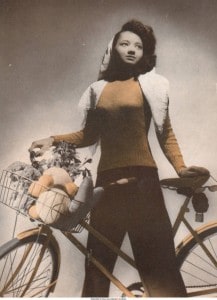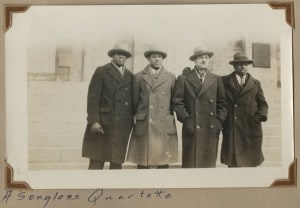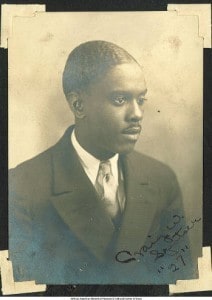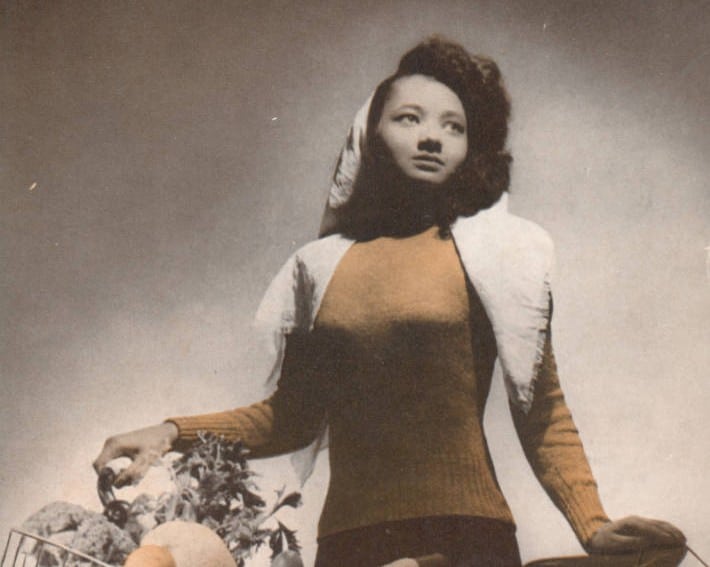We in the Digital Scholarship & Publishing Studio are reminded – daily – of the incredible digitized material held in our archives. Letters, dissertations, scrapbooks, newspapers, photographs spanning hundreds of years can be found in places like the Iowa Digital Library and Iowa Research Online.

These collections and this scholarship remind us of who has passed through here; who has informed and shaped this institution and this town. They fill gaps in the record. They bring to light the daily lives of students and citizens, from the carefree to the careful. They map out lines of inquiry and the ground we’ve covered as a scholarly community. These archives help articulate where we have been, where we are now, and, arguably, where we are going. We know ourselves through what we keep and what we do. And at Iowa we carry a tremendous history with us and everyday deepen our understanding of who we are in the research we do and discoveries we make.
In service to this idea, we’ve begun creating a series of curated pages as part of a Scholarship@Iowa initiative showcasing some of the digital scholarship and digital collections associated with the UI’s communities of diversity. With the help of our digital scholarship librarian Wendy Robertson, our digital collections librarian Mark Anderson, researcher/developer Ethan DeGross, public engagement specialist Lauren Darby, and Studio intern Andrea Bastien, we’ve begun selecting materials and scholars whose work pertains directly to these historically underrepresented groups. You’ll also find links to Library Guides created by librarians and faculty in cooperation with the Research & Library Instruction department. Our goal is to connect both current and prospective students, faculty and staff, as well as the broader public, with these resources and the wealth of knowledge and insight they provide.
Our first two pages highlight materials associated with Black History Month and Women’s History Month. The Morris Family Papers and James Morris Digital Collection, for example, trace two generations of Iowans through their time at the UI and into later life. The Patrobas Cassius Robinson scrapbook (excellently profiled by University Archivist David McCartney in an Iowa Now piece) provides glimpses of the African American community in Iowa City in the early 20th century. In a more contemporary context, we highlight Tight Spaces, a “tri-autobiography” by Kesho Scott, Cherry Muhanji, and Egyirba High that began during their time as students at the University.
We feature also feature recent work by Professors Gigi Durham and Keisha N. Blain. Professor Durham’s 2012 article, “Blood, Lust, and Love” looks at gender violence in the Twilight series. While Professor Blain recently profiled African American journalist John Q. Adams for the University of Exeter’s Centre for Imperial & Global History blog. [btw: Both Professor Durham and Professor Blain graciously deposited their work into Iowa Research Online as well – a reminder to all interested faculty that we will gladly house and look after your scholarly record.]

These pages also look beyond IRO and the IDL to other collections purchased by the UI Libraries. Under the guidance of Associate University Librarian Carmelita Pickett, the UI Libraries recently purchased several digital scholarly collections from publisher Adam Matthew. In particular, African American Communities focuses on Atlanta, Chicago, St. Louis, New York, and towns and cities in North Carolina. The collections provides access to “pamphlets, newspapers and periodicals, correspondence, official records, reports and in-depth oral histories, revealing the prevalent challenges of racism, discrimination and integration, and a unique African American culture and identity.” By acquiring these kinds of collections, the UI Libraries adds to its existing databases (available on-campus) like Readex’s African American Newspaper Series and expands the depth and breadth of primary source material available for research and study.
We’re also growing our collections on DIY History this month with the release of over 3000 pages of digitized manuscript dissertation material from the late 19th century. These materials are noteworthy both for addressing scientific discoveries in the latter half of the 1800s and for having been written by women at the University of Iowa. We’re excited to be making these primary source materials more accessible to the public and look forward to bringing more pieces of the scholarly record into view.

Throughout the year we’ll be adding pages to Scholarship@Iowa and sharing more voices that help tell the historical and contemporary stories of Iowa for new audiences. I was reminded recently of a story my predecessor Nicki Saylor shared on this blog in 2007. She was grappling with how to best explain the value of digital collections in a world informed by global and local strife and burdened with the understandably weighty concerns of everyday life. She wrote:
But the most compelling evidence of the power of digital collections arises from stories of people like Craig D. Spotser of Texas. His email, forwarded to us by Susan Kuecker at the African American Historical Museum and Cultural Center of Iowa, started this way: “GOD…..This is a picture of my Grandfather. He passed away when my father was a small boy. I only had a small picture of him, far way, standing in front of his car and home in Iowa. My father, Craig W. Spotser, has never seen a picture of him that close up, but he passed away in February 2002. This is amazing. How can I obtain a copy of the photo of my Grandfather? I was surfing the web, and this is the first time that I have seen this picture. I almost started crying. I look almost identical to him, and so does my son.”
Here is a case of a man literally finding himself, his family, at Iowa. As Nicki noted then and as I am continually reminded, discoveries like Craig D. Spotser’s are why we do this work. Use animates collections – and the collections, in turn, shape who we are and how we understand ourselves. The lives recorded in our archives come to life in communion with the people using them.
When we welcome new students, faculty, and staff to The University of Iowa; when we welcome new people to Iowa City, we welcome them into the ongoing stories of our communities and our community. To the extent that we make these resources as available and as visible as possible, we invite a growing audience of people to participate in the work of scholarship and discovery.
With that in mind, what you will find in these pages is only a small part of what you’ll find in our archives. And we encourage everyone to explore our holdings, to encounter something you didn’t know, to create new knowledge with what you find, and in so doing, perhaps, to find yourself in Scholarship@Iowa.
